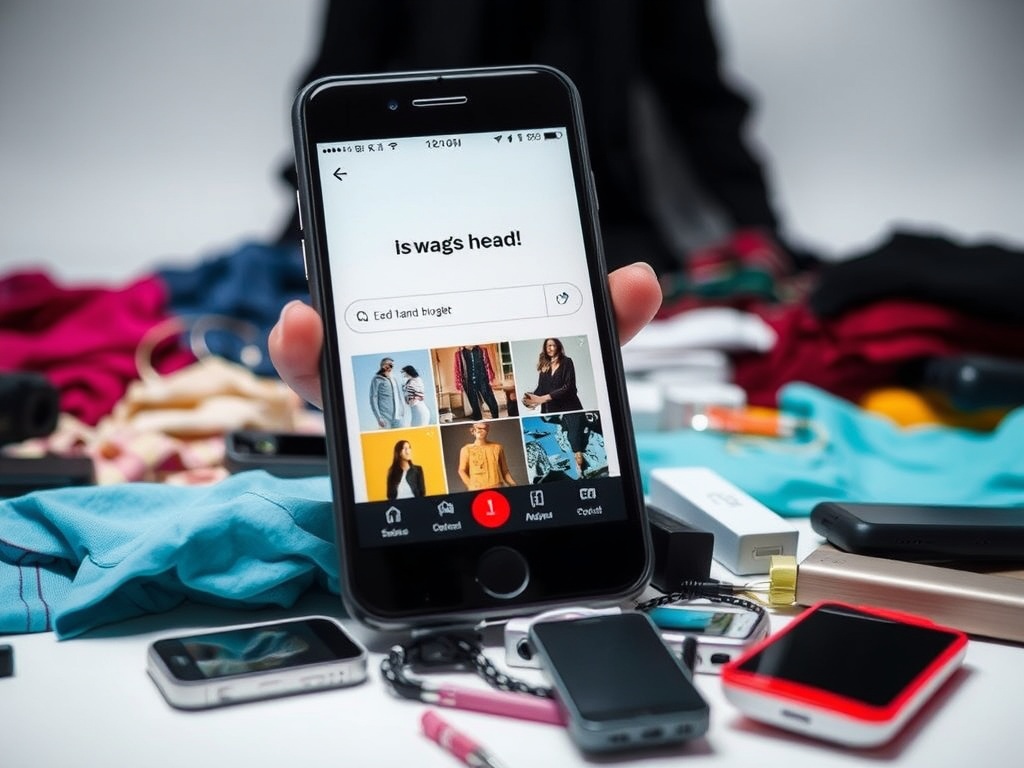The Dark Side of Second-Hand Selling

The £12 leather handbag I once cherished had seen better days. Yet, priced at a mere 10 percent of its original cost, it remained in surprisingly good condition even a decade after I first purchased it. As per my usual routine, I had dispatched it—printing labels, wrapping items in brown paper, and placing them in robotic lockers. Soon after, Vinted notified me that my bag had reached its new home. But just a few hours later, the messages began to flood in.
Forget the niceties; this is the internet, after all! The buyer wasted no time launching into a blunt appraisal: “Disgusting.” “Do you think it is acceptable to send it in that condition?” Her forthright tone caught me off guard. I don’t consider anything I own to be disgusting, but I calmly offered her a full refund if she wished to return the bag. However, she declined, likely deterred by Vinted’s policy that requires buyers to cover return shipping costs.
Determined to find a resolution, I fumbled for an alternative solution, even though I was under no obligation to do so as the seller. “God, this is painful,” she remarked about my attempts to assist her. At that point, I decided it was best to disengage from this anonymous stranger. I received a few more annoying “???” messages, which are all too common in such apps, and then silence fell. She never returned the bag.
This experience, while not the most extreme example of rude behavior online, was hostile enough to leave me feeling unsettled for a day. It was not merely the nature of her complaint that was jarring, but the manner in which it was communicated. After all, who wants to engage in a verbal war while simply trying to declutter their wardrobe? Being insulted through the tiny screen of a phone is hardly enjoyable.
Second-Hand Selling: A Booming Market
The second-hand selling market is currently thriving, propelled by platforms like Vinted, Depop, and Facebook Marketplace. Vinted boasts over 16 million users in the UK alone and reported profits of £14 million last year. While these platforms promote a more sustainable shopping approach, offering lower prices and a chance to profit from unwanted items, they also introduce a new landscape for online grievances.
These grievances can range from casual pestering, like “Have you sent it yet!?” to more severe instances of harassment and threats—“I have your address, so think carefully,” a user recently shared on Reddit. There are varying degrees of what one might consider rude; for instance, a Mumsnet AIBU (Am I Being Unreasonable) thread debated whether haggling and offering significantly lower prices were impolite. Yet, enough extreme examples exist that one Instagram account, DM Drama, has garnered over 560,000 followers by sharing screenshots of such interactions.
- In one instance, a prospective buyer angrily told a seller to “Shove it up your arse you cow” when a £10 item wasn’t reduced to £3.
- Another seller called a buyer “very insecure” and speculated she was “probably being cheated on by her boyfriend” after she requested clothing measurements.
- One buyer even showed up at a seller’s house at 1 AM just to buy a Barbie doll.
- A Channel 4 documentary, Vinted’s Dirty Laundry, aired in October, revealing a case where a buyer was threatened with violence by a seller who claimed he would come to his house with a gun.
In the Facebook group Vinted Rants, which has over 45,000 members, Hollie Fitch from Devon recounted an interaction where she was viciously insulted by a seller for simply stating she could not afford Jellycat soft rabbit toys. The seller’s response? A barrage of expletives and personal insults that included the phrase “fat ct.” Vinted does have a policy against “inappropriate behavior,” which includes “intentionally insulting other members.”
Rudeness is not the only issue at play; sexual harassment is also rampant. A colleague at The i Paper described her shock at the flood of “gross unsolicited messages” she received after listing items on Facebook Marketplace. One listing for a mirror, which showed half her face and her fully clothed body, prompted messages like “I wanted a mirror, but I’ve fallen for you instead,” and even requests for used gym shorts or leggings. Another message included a pornographic GIF with the words: “This is what I’m going to do to you in front of the mirror once I’ve picked it up.” She felt genuinely shaken for the rest of the day. The website “Vinted Sluts” was even shut down after journalist Ellie Flynn discovered that women’s photographs on Vinted were being shared there without their consent.
Understanding the Surge in Online Rudeness
But why is this surge in rudeness happening now? Are we witnessing a rise in incivility, or are more people simply becoming aware of it? Rudeness toward service workers is not a new phenomenon. As Dr. Brendan Canavan, assistant professor in marketing at Nottingham Business School, points out, service workers have historically faced disrespect from a small minority of consumers. “Service worker disempowerment is nothing new,” he states. “Online shopping replicates this dynamic.”
Online disinhibition allows bad behavior to manifest in unique ways, similar to what we see across social media platforms. The distance and anonymity of the internet embolden individuals to act in ways they might not dare in face-to-face interactions. “Digital lurking, commenting, and doxxing are low-stakes actions as they remain hidden,” Dr. Canavan explains. Furthermore, the internet is often intertwined with elements of misogyny, leading to unwelcome attention, online stalking, and a surge in inappropriate advances.
There is speculation that the diverse age range among users of these apps—90 percent of Depop’s users are under 26, with a minimum age of 13—creates different expectations for behavior. Dr. Elaine Ritch, a reader in fashion, marketing, and sustainability at Glasgow Caledonian University, argues that the current cost of living crisis and financial anxieties on both sides of the transaction also contribute to the problem. “There will be a fear of being exploited and not being in full control. We can’t physically inspect items to ensure authenticity or condition; we’re relying on photos and information provided,” she says. “Consumers are loss-averse, and we’re trying to protect our interests.”
Moreover, the faceless nature of these transactions means that both buyers and sellers are primarily focused on maximizing their own benefits. Dr. Ritch adds that societal trends are leaning towards incivility. “I believe we are witnessing a trend toward rudeness; it’s evident in our politics and seems to be a backlash against political correctness. People are increasingly self-centered, worried that others are gaining more than they are, while being protective of their own resources,” she explains.
Bernie Hogan, associate professor and senior research fellow at the Oxford Internet Institute, also emphasizes the lack of training in de-escalation techniques. Instead, individuals learn that escalating situations often yields results. “The squeaky wheel gets the grease,” he notes. “I fear we have distorted accountability signals. In school, if you behaved poorly, others would label you as ‘bad news,’ but online, there’s no enduring reputation, and review-based systems are often undermined by cynicism.”
This is particularly true of many platform review systems designed to hold users accountable. Many people are hesitant to provide honest reviews for fear of retaliation that could damage their own ratings. I’ve witnessed individuals attempting to deal with hostile customers by showering them with kindness in an effort to mitigate consequences. In my own experience, the buyer threatened to leave negative public feedback—which she ultimately did.
Despite this, I won’t shy away from using Vinted, but I will be more cautious in my approach to selling and the items I choose to list. Taking extensive photographs and keeping thorough records until the sale is finalized will become my new standard. Dr. Canavan advises sellers to avoid sharing personal details like their addresses and images of themselves. “Understand that strange customers are an occasional reality, and remember this isn’t about you. Always maintain politeness and neutrality in interactions, and if needed, take a 10-minute break to regain your composure,” he suggests.




